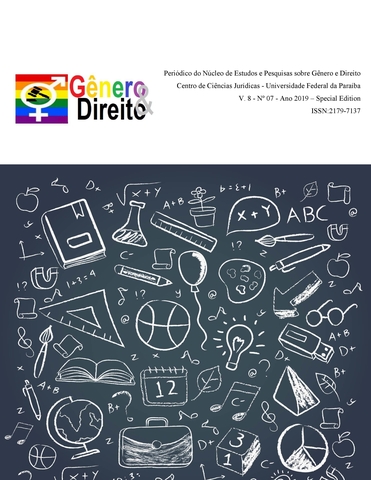THE ETHNO-CULTURAL ESSENCE OF LINGUISTIC CONSCIOUSNESS
DOI:
https://doi.org/10.22478/ufpb.2179-7137.2019v8n7.50013Palavras-chave:
ethnic culture, lexical meaning, connotations, world view, mentality, linguistic consciousness.Resumo
Each culture is based on a specific system of subject meanings, social stereotypes and cognition patterns. The “worldview” invariant is determined by socially developed supports (by meanings, in the first place). In its turn, there may be a worldview which is common for the whole society (for a socio-cultural community or ethnos) or an individual one typical of a specific group (a socio-cultural group) within a given ethnos. In the process of ontogenesis, a child learns words in its native language, while lying behind these words is an integral image of consciousness comprising two layers. The first layer is the existential one. It includes the bio-dynamic tissue of live movement and action, as well as a sensory image. The second layer is the reflexive one, which includes meaning and sense. Behind a language sign, there is an organic cell, which is part of a worldview typical of a specific culture. The systemic character of meanings reflects the system of concepts existing in a given culture, in a Universe structure (worldview) formed within this culture. It is the association component represented by figurative and metaphoric connotations that determines the semantic content of a cultural concept.
Downloads
Referências
Lomonosov M.V. (1952). Rossijskaya grammatika [Russian grammar]. Collected writings. Vol.7. Works in Philology. Moscow, 1952. 99 p.
Sapir, E. (1929) “The Status of Linguistics as Science,” Language, 5; 207-214.
Whorf, B. L. (1956). Language, thought, and reality: Selected writings of Benjamin Lee Whorf. Edited by John B. Carroll. Cambridge, MA: MIT Press.
Khomyakov, A.S. (1994). Sochineniya v dvuh tomah [works in two volumes]. Vol.1. Raboty po istoriosofii [Philosophy works]. Moscow: Moskovskij filosofskij fond Izdatelstvo "Medium", 591p.
Troubetskoy, N.S. (1998). Izbrannye Trudy [Selected worls]. Kiev.
7. Lurie, S. V. (1997). Istoricheskaya etnologiya [Historical ethnology]. 1st edition. Moscow: Aspekt Press, 448 p.
Tarasov, E.F. (2000). Aktualnye problemy analiza yazykovogo soznaniya [Cntemporary issues of linguistic consciousness analysis]. In: Yazykovoe soznanie i obraz mira / Ed. N.V. Ufimceva. Moscow: IYA RAN, pp. 24-32
Ufimceva N.V. (2000). Yazykovoe soznanie i obraz mira slavyan [Linguistic consousness and Slavic lifestyle]. In: Yazykovoe soznanie i obraz mira. Moscow, IYA RAN.
Zhinkin, N.I. (1982). Rech kak provodnik informatsii [Spech as a conductor of information]. [Predisl. R. G. Kotova, A. I. Novikova]. Moscow: Nauka.
Bohr, N. (1934/1987), Atomic Theory and the Description of Nature, reprinted as The Philosophical Writings of Niels Bohr, Vol. I, Woodbridge: Ox Bow Press.
Bohr, N. (1958/1987), Essays 1932-1957 on Atomic Physics and Human Knowledge, reprinted as The Philosophical Writings of Niels Bohr, Vol. II, Woodbridge: Ox Bow Press.
Bohr, N. (1963/1987), Essays 1958-1962 on Atomic Physics and Human Knowledge, reprinted as The Philosophical Writings of Niels Bohr, Vol. III, Woodbridge: Ox Bow Press.
Heisenberg, W. (1955). The Development of the Interpretation of the Quantum Theory, in W. Pauli (ed), Niels Bohr and the Development of Physics, 35, London: Pergamon pp. 12-29.
Heisenberg, W. (1958), Physics and Philosophy: The Revolution in Modern Science, London: Goerge Allen & Unwin.
Zinchenko, V.P. (1991). Miry soznaniya i struktura soznaniya [Worlds of consciousness and consciousness structure] // Voprosy psikhologii. Issue 2.
Saenz, P. (1997). On the sublime. In: Tracy Chevalier. Taylor & Francis, p.617.
Stepanov, Yu.S. (1997). Konstanty: Slovar russkoj kultury. Opyt issledovaniya [Constants: a dictionary of Russian culture. Research experience]. Moscow: Shkola "Yazyki russkoj kultury", 824p. pp.14, 41.
Turgenev, I.S. (2009). Virgin Soil. Translated from Russian by R.S. Townsend, 2009. URL: www.gutenberg.org/files/2466/2466-h/2466-h.html#link2H_4_0003
Katznelson, S.D. (2001). Kategorii yazyka i myshleniya: Iz nauchnogo naslediya [Language and thinking categories. From scientific heritage]. Ed. L. YU. Braude. Moscow: Yazyki slavyanskoj kultury.
Kubryakova, E.S. (1996). Kratkij slovar kognitivnyh terminov terminov [A brief dictionary of cognitive terms]. E.S. Kubryakova, V.Z. Demyankov, Yu.G. Pankrats, L.G. Luzina; Ed. E.S. Kubryakova. Moscow: Moscow State University, Faculty of Philology, 1996. p.90
Lyapin S. Kh. (1997). Konceptologiya: k stanovleniyu podhoda [Concept studies: on the approach development]. In: Kontsepty. Issue I. Arhangelsk, pp.11-35
Vorkachoyv, S.G. (2003). Kulturniy kontsept I znacheniye [Cultural concept and meaning]. In: Works of Kuban State Technological University. Humanities. Vol.17, issue 2. Krasnodar: pp.268-276.
Karasik, V.I. (2004). Yazukovoy krug: lichnost, kontsepty, diskurs [Linguistic cirle: personality, concepts, discourse]. Moscow: Gnosis, 389 p.
Kolesov, V.V. (2002). Filosofiya russkogo slova [Philosophy of a Russian word]. SPb, YuNA, 448p. pp.64, 107.
Cherneyko, L.O. (2010). Linggvofilosofskiy analiz abstraktnogo imeni [Linguo-philosophical analysis of an abstract name], 2nd edition, revised. Moscow: LIBROKOM, 272p

